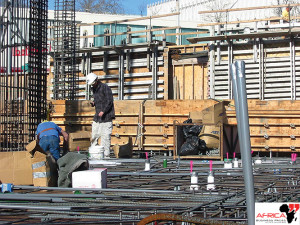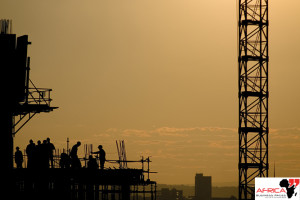Recent discoveries of coal and gas transform country’s economic outlook…
 A construction boom is underway in Mozambique, concrete proof of the ongoing economic revolution in the country. You can see new buildings and shopping centres being built everywhere in Maputo, the capital city of Mozambique. Growth hit 7.1 per cent last year, accelerating to 8.1 per cent in the final quarter. The country, ravaged by civil war for 16 years, is poised to become the world’s biggest coal exporter within the next decade, while the recent discovery of two massive gas fields in its waters has turned the region into an energy hotspot, promising a $400 billion bonanza.
A construction boom is underway in Mozambique, concrete proof of the ongoing economic revolution in the country. You can see new buildings and shopping centres being built everywhere in Maputo, the capital city of Mozambique. Growth hit 7.1 per cent last year, accelerating to 8.1 per cent in the final quarter. The country, ravaged by civil war for 16 years, is poised to become the world’s biggest coal exporter within the next decade, while the recent discovery of two massive gas fields in its waters has turned the region into an energy hotspot, promising a $400 billion bonanza.
Local analysts estimate that gas could bring Mozambique revenue of $200bn to $400bn over the next 40 years. This would be a huge windfall in a country where, despite the impressive recent growth, GDP stands at a modest $1,100 a head and government spending at $6 billion.
Mozambique may soon become one of the main producers of natural gas in Africa due to natural gas reserves found in the “Camarão” well. The unit can start production in 2018 and become “the biggest capital investment in Mozambique to date, establishing hydrocarbons as large new sector of the economy.
The national currency was the best performing in the world against the dollar. Investment is pouring in on an unprecedented scale; as if to prove that history has a sense of irony, Portuguese feeling Europe’s economic pain are flocking back to the former colony, scenting better prospects than at home.
Business is growing too, the middle class is growing, the level of professionalism and service delivery has gone up in leaps and bounds. Maputo is a metropolis now – it functions like a city should in this day and age.
New shopping centres and hotels are struggling to keep up with demand, restaurants where pre-booking is now a must and lengthening traffic jams of expensive cars – all point to the imporving economy of the country. Almost every week brings a fresh business delegation from countries such as Australia, Brazil, Britain, India, Norway, Turkey and China.
CR Holdings is spending $50 million to build a hotel, housing and Portuguese-designed shopping centre in Tete, a hot and isolated town dubbed “the new Johannesburg” because of the coal rush that is expected to attract 3,000 foreign workers.
 Mozambique’s time has come partly thanks to location: Asia, especially energy-hungry India, is eager to acquire liquefied natural gas. The discovery triggered a bidding war for the London-listed Cove Energy, which has an 8.5% stake in the Rovuma gas field.
Mozambique’s time has come partly thanks to location: Asia, especially energy-hungry India, is eager to acquire liquefied natural gas. The discovery triggered a bidding war for the London-listed Cove Energy, which has an 8.5% stake in the Rovuma gas field.
Adrian Frey, director of an estate agency, Pam Golding Properties Mozambique, summed up the mixed mood: “Gas changes everything. It changes our thinking. The investment expected in the next 10 years is $30bn. There is a huge demand for building and water and restaurants and banking facilities. We are on the right track and everything is getting better.”















